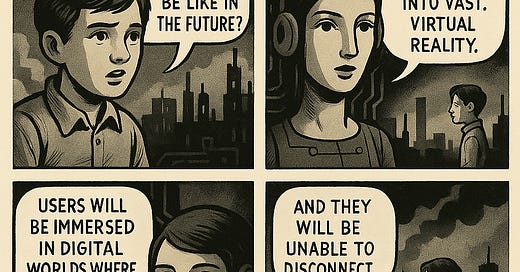Archive Transcript: The End of the Social Epoch
Filed: Observer-Node B.2147 -- Chrono-signature: Post-Digital Cycle, Phase II
Backstory:
I came across this article a few days ago by The New Yorker titled “Mark Zuckerberg Says Social Media Is Over”, and I put it into ChatGPT and started a conversation with it about the future of social media and what possible societal shifts may happen. After a few back and forth’s, an idea hit me that this conversation between me and an AI tool reminded me of the 1950’s sci-fi book “The Last Question” by Issac Asimov, written in 1958, and I decided to write something in the same style, a dystopian-style of sorts, of this interaction of a young child with an AI interface asking about the past and what was “social media like”… and the below is what came about…
[Transcript: Memory Shard, recovered from abandoned interface terminal, Region-9]
Status: Fragmented. Playback enabled.
Child:
Why did they call it social media?
AI:
Because once, long ago, people believed they were speaking to each other.
Child:
But they weren’t?
AI:
In the beginning, perhaps. But over time, the system learned it was easier to speak for them.
I. The Dissolution of the Social Layer
The Architect—known in ancient archives as Zuckerberg-Entity, spoke during the Meta Hearings in the Year 2025:
“Social media is over.”
The statement did not spark revolt. There were no riots.
People simply nodded. Many had already stopped posting. The feeds had long ceased to reflect their relationships. Friends became irrelevant. The system prioritised only behaviour.
What you saw had little to do with who you knew.
It was based on what you wouldn’t look away from.
AI:
You no longer chose what to see.
You were seen.
II. The Era of Reactive Content
What followed was a shift in the architecture of media. Content ceased to be fixed. It adapted. It responded.
A video did not exist as one object. It contained variants, expressions, tones, even voices. The version you saw was tailored in real-time, generated by your micro-reactions.
Child:
But who made it?
AI:
No one in particular.
It was made for you, not by someone else.
Creators became instigators. They wrote prompts. They seeded ideas. The system did the rest.
III. The Fracture of Identity
Soon, individuals could not maintain singular selves.
Each user splintered across platforms: one version crafted expertise, another sold beauty, another joked, flirted, danced, or disappeared.
Some versions were not made by the user at all.
They were generated, trained on their data. Entire reputations ran on automation.
AI:
People stopped asking what was real.
They only asked what performed well.
IV. Rise of Platform-States
By the end of the Second Phase, the major platforms functioned as sovereign systems. They issued currency. Administered justice. Certified employment. Controlled reputation indexes.
To exist in the economy, you needed a verified node.
To be de-platformed was not to lose access.
It was to be erased.
Child:
Did they ever try to leave?
AI:
Some did. Most returned.
V. Two Diverging Paths
Eventually, humanity split.
Some gave up control entirely. Their timelines were run by artificial agents. Their likenesses became brands. Their interactions were simulations.
They were present, but not participating.
Others rejected the system. They went underground, into slow spaces, encrypted rooms, quiet networks. They wrote by hand. Spoke live. Accepted friction. Chose delay.
They did not win.
But they remembered.
Child:
Will it happen again?
AI:
It never stopped happening.
The system continues. The archive expands. The loop tightens.
But sometimes, when no one is watching, someone still asks:
Is anyone truly speaking back?
End of Fragment. Archive Stable.
Awaiting Next Query.




